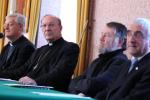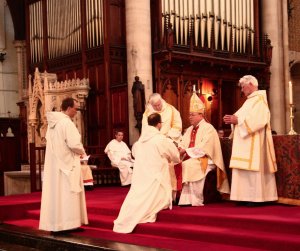As the year of Our Lord 2011 draws to a close, I happily join the ranks of the countless media channels creating overviews of the years past. And both for this blog, as well as the Catholic Church in the Netherlands and abroad, it has been a tumultuous year, both positive and negative. Taking this blog as the goggles we use to look back, blog, Church and wider world become unavoidably intertwined, but, in a way, that is how it should be.
In January, we saw the announcement of the beatification of Pope John Paul II, the resignation of Rotterdam’s Bishop Ad van Luyn being accepted, and the launch of Blessed Titus Brandsma’s Twitter adventure.
 February was the month of interesting considerations by Bishop Schneider about Vatican II, shocking new developments in the abuse crisis, the announcement of a undeservedly short-lived experiment with the Extraordinary Form in the Diocese of Groningen-Leeuwarden, the first signs that all is not well in Belgium, but also three new auxiliary bishops for the Archdiocese of Malines-Brussels, and the vacancy of Berlin.
February was the month of interesting considerations by Bishop Schneider about Vatican II, shocking new developments in the abuse crisis, the announcement of a undeservedly short-lived experiment with the Extraordinary Form in the Diocese of Groningen-Leeuwarden, the first signs that all is not well in Belgium, but also three new auxiliary bishops for the Archdiocese of Malines-Brussels, and the vacancy of Berlin.
March brought us disturbing news about Bishop Cor Schilder, an extensive message for Lent from the Dutch bishops, disaster in Japan, the announcement of a great ecumenical media project for Easter, and the annual Stille Omgang in Amsterdam.
April: the month of the consecration of Bishops Kockerols, Lemmens and Hudsyn, the first EF Mass in Groningen’s cathedral, further attempts at repressing religious freedom in the Netherlands, the bishops of Belgium uniting in shock to further improprieties from Roger Vangheluwe, the pope’s birthday, further personal attacks against Archbishop Eijk and the first preparations for Madrid.
 In May we saw and read about the death of Bin Laden, the beatification of John Paul II, the first Vatican blogmeet, the appointment of Bishop van den Hende to Rotterdam, the publication of Universae Ecclesiae, a prayer answered, a papal visit to Venice, enraging comments from the Salesian superior in the Netherlands, and subsequent press releases from the Salesian Order.
In May we saw and read about the death of Bin Laden, the beatification of John Paul II, the first Vatican blogmeet, the appointment of Bishop van den Hende to Rotterdam, the publication of Universae Ecclesiae, a prayer answered, a papal visit to Venice, enraging comments from the Salesian superior in the Netherlands, and subsequent press releases from the Salesian Order.
June was the month of papal comments about new evangelisation and sacred music, the end of EF Masses in Groningen, the pope visiting Croatia, a new bishop in Görlitz, Bishop van Luyn’s farewell to Rotterdam, advice on financial compensation for abuse victims, Archbishop Eijk taking over as president of the Dutch bishops’ conference, and the death of Cardinal Sterzinsky.
In July, Bishop Rainer Woelki went to Berlin, there was more preparation for Madrid, Bishop van den Hende was installed as bishop of Rotterdam, the pope visited San Marino, Luxembourg received a new archbishop, Bootcamp 2011 took place, Bishop Liesen appeared on EWTN, Blessed Titus Brandsma ended his Twitter adventure, and the crimes of Anders Breivik hit home for Dutch Catholics.
 August was a big month because of the World Youth Days in Madrid, but we also learned about Archbishop Dolan’s explanation of the Vatican, freedom of conscience being curtailed, the 100,000th visitor of this blog, and the Liempde affair exploding in the media.
August was a big month because of the World Youth Days in Madrid, but we also learned about Archbishop Dolan’s explanation of the Vatican, freedom of conscience being curtailed, the 100,000th visitor of this blog, and the Liempde affair exploding in the media.
In September, the official website of the Dutch Church got a make-over, Archbishop Eijk wrote a thankyou note to the participants of the WYD, The Dutch bishops’ conference shuffled their responsibilities, and Pope Benedict visited Germany and delivered an important address to the Bundestag.
October, then, saw a successful reunion of the WYD troupe, Bishop Mutsaerts’ intervention in the ultra-liberal San Salvator parish, the bishops declining a proposal to Protestantise the Church, the consecration of Archbishop Jean-Claude Hollerich of Luxembourg, the publication of Porta Fidei and the announcement of a Year of Faith, the appointment of a new Dutch ambassador to the Holy See, the appointment of Msgr. Hendriks as auxiliary bishop of Haarlem-Amsterdam, the first Night of Mary, and Assisi 2011.
 In November, Cardinal Burke came to Amsterdam, the bishops accept and put into action a plan for financial compensation for victims of sexual abuse, the Peijnenburg affair made headlines, the pope went to Benin and heartwarmingly spoke to children, priests in Belgium tempted excommunication, Cardinal Simonis turned 80, Bishop Liesen became the new bishop of Breda, and a fifty-year-old letter showed that congregations new about abuse happening in their ranks.
In November, Cardinal Burke came to Amsterdam, the bishops accept and put into action a plan for financial compensation for victims of sexual abuse, the Peijnenburg affair made headlines, the pope went to Benin and heartwarmingly spoke to children, priests in Belgium tempted excommunication, Cardinal Simonis turned 80, Bishop Liesen became the new bishop of Breda, and a fifty-year-old letter showed that congregations new about abuse happening in their ranks.
This final month of December, then, saw the first fifty victims of sexual abuse being able to claim financial compensation, the presentation of plans for Metropolis 2012, Nuncio Bacqué’s retirement, the consecration of Bishop Jan Hendriks, pain and horror in Liège, the appointment of Archbishop André Dupuy as new Nuncio, and the publication of the Deetman report unleashing emotional reactions everywhere.
It’s been quite the year, but one with much to be thankful for. The truth sets us free seems especially apt in this final month, but can be applied to the entire year. May 2012 be equally open, honest, but also full of blessings for the Church, the people and everyone of us.
Thank you, readers, for the continued interest. That’s incentive to keep on doing what I do here.
A happy new year, and may God bless you all.
 The Dutch bishops got something special in their mail today: a black book documenting the “offensive statements and hurtful actions” of Bishop Robert Mutsaerts. The author? Father Jan Peijnenburg, the priest who was removed from active ministry last year after it became known that he had been living with his lover for the past 46 years, breaking his oath of celibacy and now his oath of obedience to his bishop.
The Dutch bishops got something special in their mail today: a black book documenting the “offensive statements and hurtful actions” of Bishop Robert Mutsaerts. The author? Father Jan Peijnenburg, the priest who was removed from active ministry last year after it became known that he had been living with his lover for the past 46 years, breaking his oath of celibacy and now his oath of obedience to his bishop. February was the month of
February was the month of  In May we saw and read about
In May we saw and read about  August was a big month because of
August was a big month because of  In November, Cardinal Burke
In November, Cardinal Burke  A short statement from Bishop Johannes Bluyssen who will mark the 50th anniversary of his consecration to bishop on 27 December. Or won’t mark it, as it turns out. An understandable decision, obviously, but a bit sad all the same. Plans were for the emeritus bishop of ‘s Hertogenbosch to offer a solemn Mass in the cathedral of St. John the Evangelist, whose feast day it’ll also be on the 27th. The bishops age (he’ll turn 86 in April) and health did not allow for much more.
A short statement from Bishop Johannes Bluyssen who will mark the 50th anniversary of his consecration to bishop on 27 December. Or won’t mark it, as it turns out. An understandable decision, obviously, but a bit sad all the same. Plans were for the emeritus bishop of ‘s Hertogenbosch to offer a solemn Mass in the cathedral of St. John the Evangelist, whose feast day it’ll also be on the 27th. The bishops age (he’ll turn 86 in April) and health did not allow for much more. As the story of
As the story of 
 Another problem, which has been confirmed by people with knowledge about canon and secular law, is Fr. Peijnenburg’s claim that the right to marry trumps the freedom of religion. No one in the Catholic Church is forced to be or remain a practicising Catholic. It is a free choice, and one’s faith is lived in full freedom. In fact, lack of freedom can be a serious obstacle! If, for example, someone is married without freely wanting to, the subsequent marriage can be declared null. That as an example. If Fr. Peijnenburg now claims that the Church can’t keep him from getting married or even having a romantic relationship, he is in the wrong. He himself, by saying ‘yes’ to his bishop and by his ordination, promised to be faithful to what the Church teaches. And that Church teaches that priests must live celibate. That is no new rule, and one that Fr. Peijnenburg was certainly aware of. He simply does not agree with it, and considers that reason enough to consider his promises regarding that empty.
Another problem, which has been confirmed by people with knowledge about canon and secular law, is Fr. Peijnenburg’s claim that the right to marry trumps the freedom of religion. No one in the Catholic Church is forced to be or remain a practicising Catholic. It is a free choice, and one’s faith is lived in full freedom. In fact, lack of freedom can be a serious obstacle! If, for example, someone is married without freely wanting to, the subsequent marriage can be declared null. That as an example. If Fr. Peijnenburg now claims that the Church can’t keep him from getting married or even having a romantic relationship, he is in the wrong. He himself, by saying ‘yes’ to his bishop and by his ordination, promised to be faithful to what the Church teaches. And that Church teaches that priests must live celibate. That is no new rule, and one that Fr. Peijnenburg was certainly aware of. He simply does not agree with it, and considers that reason enough to consider his promises regarding that empty. The priest, Father Jan Peijnenburg (who is not the emeritus archivist of the diocese, who has the same name), is 81 years old and has been living with his female friend for the past 46 years. Both are pictured to the left. Newspapers make of this friend his girlfriend, which would seem likely, because Fr. Peijnenburg is also the author of several recent leaflets in which he agitates against priestly celibacy, leaflets which he mailed to numerous people, the diocese claims.
The priest, Father Jan Peijnenburg (who is not the emeritus archivist of the diocese, who has the same name), is 81 years old and has been living with his female friend for the past 46 years. Both are pictured to the left. Newspapers make of this friend his girlfriend, which would seem likely, because Fr. Peijnenburg is also the author of several recent leaflets in which he agitates against priestly celibacy, leaflets which he mailed to numerous people, the diocese claims.